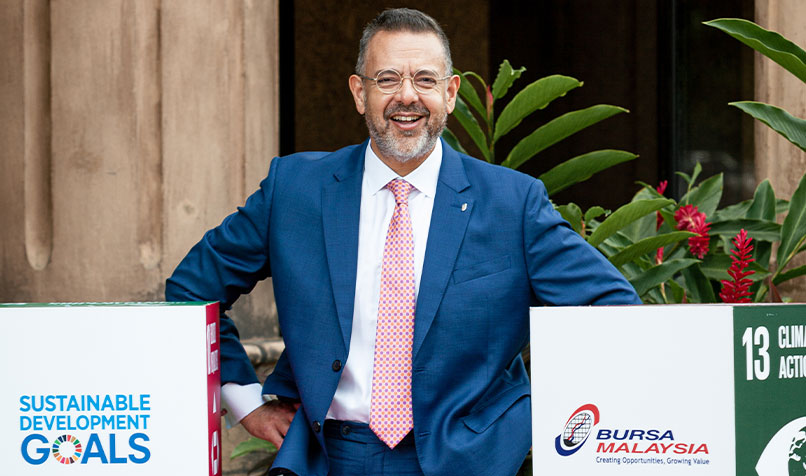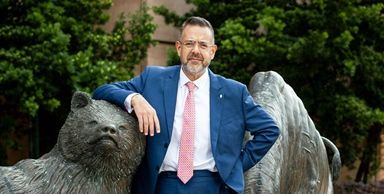Loading component...
At a glance
- Datuk Muhamad Umar Swift FCPA is CEO of Bursa Malaysia, the Malaysian Stock Exchange.
- In 2020, Swift and his team launched Bursa Academy, an e-learning platform aimed at enhancing capital market knowledge among investors.
- According to Swift, these online education platforms have contributed to increased capital market participation by younger institutional investors.
For an accountant who likes all his “ducks in a row”, Datuk Muhamad Umar Swift FCPA has become increasingly comfortable with uncertainty.
Chief executive of Bursa Malaysia, the country’s listed stock exchange operator, Swift joined the organisation in February 2019 at a time of escalating trade tensions, concerns about a “no deal” Brexit and volatility in commodity-related sectors.
Within a year, the global pandemic brought economic activity to a near standstill as countries across the globe sought to curb the spread of COVID-19.
Swift was forced to make quick decisions “based on the data that was in front of us”.
A significant lift in the number of retail investors in 2020, for instance, prompted Swift and his team to launch Bursa Academy, an e-learning platform to boost knowledge of capital markets.
The exchange instituted a number of relief measures for publicly listed companies, such as fee waivers and annual listing fee rebates. It collaborated with broker partners to build awareness of stock market investing among specific segments, such as women, millennials and university students.
Growing investor expectations about sustainable investment options were also met through increased promotion of Shariah-compliant investments and the recent launch of the FTSE4Good Bursa Malaysia Shariah Index.
“My aim is to remove barriers and remove objections,” says Swift. “I want investors to be educated about the market. I want them to understand what they’re investing in. I want people to talk about companies. I want them to read and critique annual reports. Education and engagement are how you create a sustainable market for the long term.”
Join the conversation
A different view
Swift began his finance career in audit and assurance at PwC in Melbourne in the late 1980s, before moving into an insolvency role, where he saw “conglomerates being dismantled because they were based on debt”.
“This was a time when equity was expensive, and companies were putting a lot of debt on their balance sheet,” says Swift.
“The moment there was an inflexion, there was no resilience and no ability to navigate. That’s when we would step in, look at the nature of the problem, try to salvage value and keep people employed.”
Swift moved from PwC to Bank of Singapore, now OCBC, and was soon approached for the role of general manager finance at Gas Malaysia. Within a year, at the age of 32, he was promoted to CEO.
Subsequent leadership roles include the top job at Malaysian Assurance Alliance, now Zurich Insurance Malaysia, but leading Bursa Malaysia presented an opportunity that Swift says “doesn’t come around too often”.
“It also came with the opportunity to make changes,” says Swift.
“We’re moving from being predominately a cash equities business and looking at different asset classes. We’re also growing our derivatives business.”
Bursa Malaysia is a profit-driven entity and, like many exchanges, it is listed on itself. It also plays the role of front-line regulator to publicly listed companies.
“We’re regulated by the Securities Commission,” says Swift. “We have an overriding obligation to grow the capital market and create that virtuous cycle, so companies can raise capital and employ people, pay tax, pay dividends. We’re also an agency of the Ministry of Finance, so we sit under government as well.
“We wear many hats, but the exchange is a marketplace, and the market is only as good as what you have for sale,” adds Swift. “Clearly, for many listed companies, the pandemic is challenging the profitability, longevity and business principles in which they operate.
“The key for us as an exchange – and this is completely selfish – is we need to get people back at work, buying goods and services, buying shares in publicly listed companies, so the whole economy can get working again.”
Changing investor profiles
Malaysia entered the COVID-19 crisis from a position of relative strength and, for the first half of 2020, Bursa Malaysia was the strongest-performing market among the emerging markets in ASEAN.
Swift notes that, while Bursa Malaysia’s capitalisation-weighted stock market index, FBMKLCI, fell by 5.5 per cent in the first half of 2020, other key markets in ASEAN experienced larger declines of between 14 per cent and 22 per cent in terms of their benchmark indices.
Although short-term investors and speculators exited the market in 2020, strategic and long-term investors stayed the course, and foreign ownership of Malaysian equities remained above 20 per cent.
"More people are looking to the social impact of business, which I think is important. And, at the end of the day, if we continue to warm the earth, we're not going to have anywhere to love or to do business."
Bursa Malaysia was also buoyed by a significant increase in retail investors last year, when retail participation reached a 10-year high of 34.3 per cent. The RM14.3 billion (A$4.7 billion) of net buying by local retail investors for the year surpassed the RM8.1 billion (A$2.7 billion) by local institutional investors. The retail segment continued to be net buyers well into 2021.
Swift says the introduction of online education platforms such as Bursa Academy and Mirror, Learn & Trade has contributed to driving growth among younger institutional investors.
“What was once seen as an older generation’s investment is now seen as accessible and interesting because of online trading,” says Swift. “The move to working and investing from home required upscaling to support brokers and, I’m happy to say, it’s achieved dividends. It was a collective effort by the whole industry.”

Promoting sustainable growth
As economies across the globe transition to recovery, Swift says local exchanges play a key role in helping companies return to profitability.
“We need to look at what market rules may impede them,” he says. “We also have an opportunity to promote ESG [environmental, social and governance] investment. Is there a causal nexus between ESG and profit? My contention is that there is, but I need to demonstrate that.”
Bursa Malaysia’s promotion of ESG investment comes at time of growing investor demand for accountability and action on issues such as climate change. The recent Intergovernmental Panel on Climate Change’s (IPCC) report, for instance, sets a clear mandate for urgent action from financial decision-makers.
“Consumers are embracing sustainability,” says Swift. “Traditionally, governance moved the dial the most, because poor governance is generally an indicator of underperformance.
“Since the pandemic, however, more people are looking to the social impact of business, which I think is important. And, at the end of the day, if we continue to warm the earth, we’re not going to have anywhere to live or to do business.”
Good ESG behaviour should be rewarded, adds Swift.
“Bursa Malaysia currently has 76 companies qualifying for our FTSE4Good index, accounting for 24 per cent of the eligible universe, which refers to publicly listed companies in the Bursa Malaysia EMAS Index.
There is still room for improvement. My call to action is, if you are an immediate manufacturer and your customers want you to be ‘green’ and you’re not, they’ll move their purchasing to someone who is.”
Swift notes that capital investments in ESG are increasing, along with the number of signatories to sustainable investment practices. The challenge, however, is the development of a green taxonomy.
He adds that countries such as Malaysia are developing green taxonomies for their jurisdictions. Bank Negara, for instance, is finalising a climate change and principles-based taxonomy that will create a common language for categorising economic activities based on the impact on climate change.
“At the moment, we have best practice, we talk about the disclosure that we want to see, and we are seeing more maturity in the quality of [climate] reporting,” says Swift. “I think we’ll soon have certain parameters where disclosure is mandatory.”
Sustainability forms an important pillar of Bursa Malaysia’s strategic direction, and Swift believes the common language of a taxonomy will provide greater certainty for the market.
“I’m a great believer in shareholders actively engaging management and giving feedback,” says Swift. “Our virtual AGMs are very well attended – during the last one, I answered about 170 questions.
“I see this as a good sign, because it shows that people are interested. They are keen to participate, and they expect accountability.”
Strengthening ESG credentials
In July this year, Bursa Malaysia and global index provider FTSE Russell launched FTSE4Good Bursa Malaysia Shariah (F4GBMS), an ESG-themed index designed to track constituents in the FTSE4Good Bursa Malaysia (F4GBM) Index that are Shariah-compliant, according to the Securities Commission Malaysia Shariah Advisory Council screening methodology.
Shariah investing mandates social values and good governance by filtering out businesses that engage in activities deemed unethical.
Datuk Muhamad Umar Swift FCPA, CEO of Bursa Malaysia, says the launch of the F4GBMS Index caters to the growing demand for Shariah-compliant investment tools.
“With the convergence between ESG and Islamic investing, it introduces a new dimension for local fund managers by embedding Shariah principles into an ESG index,” he says.
The F4GBM was launched in 2014, with 24 publicly listed companies among its constituents. Today, there are 76.
“We also have Bursa Sustain, which is a resource centre to help people better understand ESG and what it means to them,” says Swift.
“COVID-19 has given us all an opportunity to disrupt supply chains, and we should be looking to new markets that fit with our ESG credentials, rather than just settling back into our previous ways.
“It’s time to strengthen relationships – and build new ones – based on an ESG lens. A commitment to ESG will also make it easier to raise capital going forward. Momentum is growing and the pandemic has been a call to action.”

